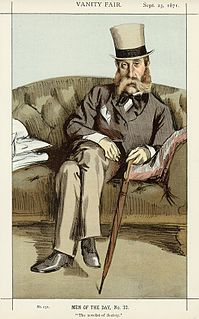A Quote by George Whyte-Melville
In the choice of a horse and a wife a man must please himself ignoring the opinion and advice of friends.
Related Quotes
I lay very little stress either upon asking or giving advice. Generally speaking, they who ask advice know what they wish to do, and remain firm to their intentions. A man may allow himself to be enlightened on various points, even upon matters of expediency and duty; but, after all, he must determine his course of action, for himself.
To an eagle or to an owl or to a rabbit, man must seem a masterful and yet a forlorn animal; he has but two friends. In his almost universal unpopularity he points out, with pride, that these two are the dog and the horse. He believes, with an innocence peculiar to himself, that they are equally proud of this alleged confraternity. He says, 'Look at my two noble friends -- they are dumb, but they are loyal.' I have for years suspected that they are only tolerant.
No man could bring himself to reveal his true character, and, above all, his true limitations as a citizen and a Christian, his true meannesses, his true imbecilities, to his friends, or even to his wife. Honest autobiography is therefore a contradiction in terms: the moment a man considers himself, even in petto, he tries to gild and fresco himself. Thus a man's wife, however realistic her view of him, always flatters him in the end, for the worst she sees in him is appreciably better, by the time she sees it, than what is actually there.
My library is my kingdom, and here I try to make my rule absolute-shutting off this single nook from wife, daughter and society. Elsewhere I have only a verbal authority, and vague. Unhappy is the man, in my opinion, who has no spot at home where he can be at home to himself-to court himself and hide away.
There is a story in Zen circles about a man and a horse. The horse is galloping quickly, and it appears that the man on the horse is going somewhere important. Another man standing alongside the road, shouts, «Where are you going?» and the first man replies, «I don't know! Ask the horse!» This is also our story. We are riding a horse, and we don't know where we are going and we can't stop. The horse is our habit energy pulling us along, and we are powerless.
Man has risen, not fallen. He can choose to develop his capacities as the highest animal and to try to rise still farther, or he can choose otherwise. The choice is his responsibility, and his alone. There is no automatism that will carry him upward without choice or effort and there is no trend solely in the right direction. Evolution has no purpose; man must supply this for himself. The means to gaining right ends involve both organic evolution and human evolution, but human choice as to what are the right ends must be based on human evolution.
There are three kinds of nature in man, as Nicetas Stethatos further explains: the carnal man, who wants to live for his own pleasure, even if it harms others; the natural man, who wants to please both himself and others; and the spiritual man, who wants to please only God, even if it harms himself. The first is lower than human nature, the second is normal, the third is above nature; it is life in Christ.
See how he cowers and sneaks, how vaguely all the day he fears, not being immortal nor divine, but the slave and prisoner of his own opinion of himself, a fame won by his own deeds. Public opinion is a weak tyrant compared with our own private opinion. What a man thinks of himself, that it is which determines, or rather indicates, his fate.
That man can destroy life is just as miraculous a feat as that he can create it, for life is the miracle, the inexplicable. In the act of destruction, man sets himself above life; he transcends himself as a creature. Thus, the ultimate choice for a man, inasmuch as he is driven to transcend himself, is to create or to destroy, to love or to hate.






































